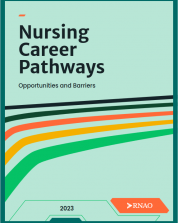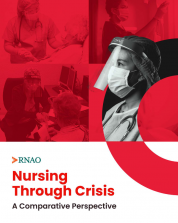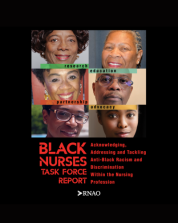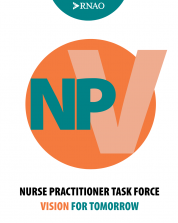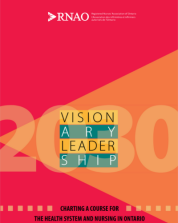Nursing Career Pathways examines the nursing profession and the opportunities before the government to build nursing careers and fix Ontario’s health system.
This report outlines a number of recommendations geared to retain nurses in the profession and build Ontario’s registered nurse (RN) workforce, such as repealing Bill 124, expediting applications and finding pathways for internationally educated nurses, and more.
RNAO launched its Black Nurses Task Force (BNTF) in June 2020 to acknowledge, address and tackle the anti-Black racism deeply ingrained in the nursing profession. The report aims to highlight the work of the BNTF and presents 19 specific recommendations and accompanying actions to dismantle anti-Black racism in the profession, including nursing and academic settings.
RNAO’s Work and Wellbeing Survey Results tells the story of nurses and a nursing workforce under considerable stress and strain as a result of the COVID-19 pandemic. While all nurses have been affected by the pandemic, how they experience levels of stress and strain are as unique as the nurses themselves as they struggle with job demands and their own life circumstances.
On Feb. 25, 2021, RNAO released the Nurse Practitioner Task Force report, Vision for Tomorrow. This report features eight recommendations that reflect RNAO’s unwavering advocacy for increased NP supply, utilization and scope. The implementation of these recommendations must begin immediately with co-ordinated action from government, academic, health service and association stakeholders.
Enhancing Community Care for Ontarians (ECCO) 3.0 calls on the government and health system partners to strengthen community care and anchor the health system in primary care to better meet the health needs of all Ontarians. First released in 2012 and next in 2014, ECCO 3.0 aligns with much needed health system transformation that responds to the COVID-19 pandemic.
Ontario's population is aging and its needs are changing. If we're going to keep pace, we can't get tripped up by short-sighted budgetary decisions. We need the right care providers at the right time, and that means reclaiming the role of the registered nurse in the name of patient safety.
Coming together, moving forward: Building the next chapter of Ontario's rural, remote and northern nursing workforce.
In October 2012, the Registered Nurses’ Association of Ontario (RNAO) issued Enhancing Community Care for Ontarians (ECCO) 2.0, a bold model for health system transformation. Subject to significant praise, debate and discussion, this model generated timely and important dialogue on how to make the system more integrated and person‐centred, while ensuring the ongoing sustainability of a publicly‐funded and not‐for‐profit delivery model.
It’s important to look down the road, today, and begin planning the future of our health system. By doing so, we can reach our destination with a clear sense of what we want, and how we get there. The work of RNs and NPs is central to Ontario’s health system. The role they play is critical to creating a system that is person-centred, timely, effective, and efficient. Visionary Leadership outlines a bold vision to ensure Ontarians are served by a system that better reflects their needs.
